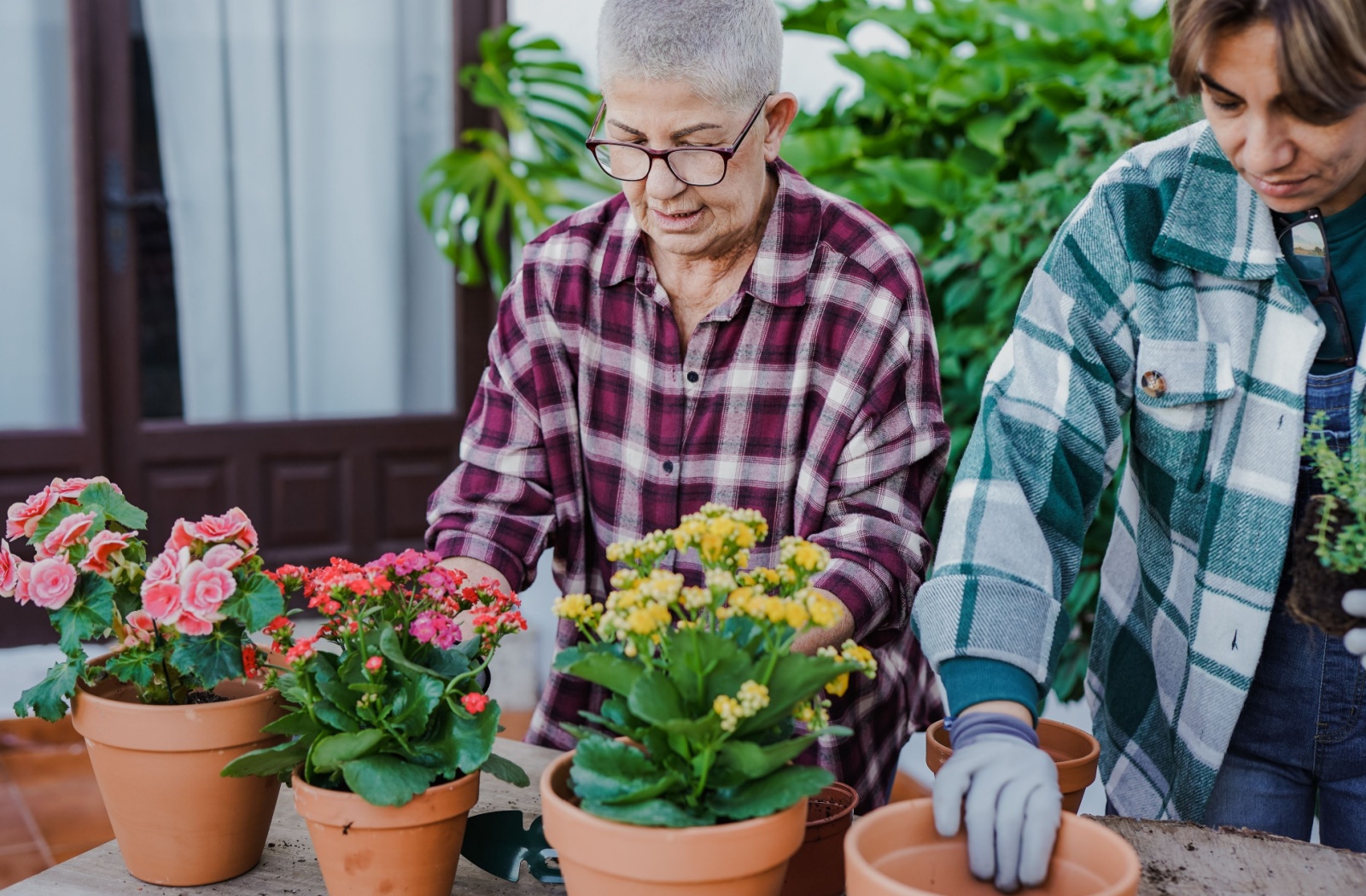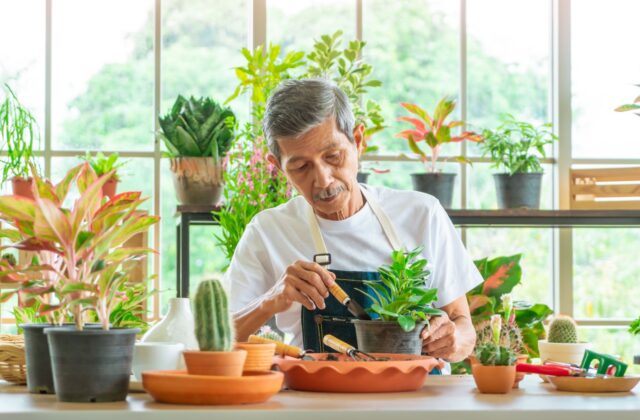Gardening is a popular hobby for seniors across America. The feeling of having a beautiful flowerbed or harvesting strawberries at the end of the growing season can be incredibly rewarding. But did you know that the benefits of gardening for seniors go beyond how good it makes you feel?
Staying active and having a lively social life are great ways to maintain your health as a senior. Gardening can be a great way to stay active and socialize with others, boosting health and wellness. Gardening can also help seniors with their mental health and fine motor skills, and can even help slow the progression of Alzheimer’s and dementia.
Gardening for Physical Health
Gardening offers a fantastic way for seniors to stay active and improve their physical health. Whether it’s planting flowers, tending to vegetables, or enjoying the outdoors, the benefits are extensive, including increased strength and balance, heart health, and diet.
Better strength, flexibility, and balance
Gardening has been shown to improve gardeners’ strength and physical health. This is because gardening involves various physical activities like bending, squatting, and lifting. Physical activity can also help to improve overall balance and flexibility, which can help seniors stay mobile longer and reduce their risk of falling.
Better Heart Health
Since gardening is a light to moderate form of exercise, it can have positive impacts on cardiovascular health. Research has shown a connection between gardening and better heart health in adults over the age of 65.
Better Diet
By growing fruits and vegetables in your garden, you end up with access to fresh, delicious, and nutritional food at harvest time! Individuals who garden tend to eat more fruits and vegetables than those that don’t. This improvement in diet can help you feel better and make weight management easier.
Happy Gardening, Happy Mind
The benefits of gardening go beyond the physical. Gardening can also be a great way to improve your mental health!
Reduced Stress
Stress can take a toll on the mental, physical, and cognitive health of seniors. Gardening is a proven way to reduce stress. Reducing stress allows seniors to feel better, and results in improvements in their mental health.
Better Mental Health
Gardening has been linked to improvements in mood and reduced anxiety and depression. Part of this is due to the time people pend outside when gardening. Being outside allows us to get enough vitamin D from the sun, which can combat negative mental health. The physical exercise and emotional fulfillment from gardening also contribute to more positive moods and well-being in older adults.
Sense of Accomplishment
Successfully caring for a garden can provide gardeners with a sense of pride and accomplishment. This sense of accomplishment and purpose can lead to higher self-esteem and overall better mental health.
Mindfulness & Meditation
One great thing about gardening is that it’s a productive way to make some time for yourself. This time can be used by gardeners for reflection.
Meditation has been linked to positive mental health. When gardening, gardeners can take some quiet time to reflect on things that have been on their minds. Or, gardeners can simply be present and enjoy their time in the garden. This is called mindfulness, which has also been linked to better mental health.
Keeping Your Brain Sharp
 The benefits of gardening for your brain don’t just stop at your mental health. Gardening can help with your cognitive health as well. Because gardening requires concentration, problem-solving, and decision-making, it can help keep your mind sharp as you age.
The benefits of gardening for your brain don’t just stop at your mental health. Gardening can help with your cognitive health as well. Because gardening requires concentration, problem-solving, and decision-making, it can help keep your mind sharp as you age.
Enhanced Memory & Concentration
Gardening can help you maintain cognitive function as you age. Gardening requires you to plan extensively, think ahead, and remember minor details. Studies have shown that there is a link between gardening and brain health as well as gardening and cognitive function in older adults.
Better Problem-Solving
Sometimes, things can go wrong when gardening. Gardeners may find themselves strategizing about the best way to battle pests or plan garden layouts or trying to decide when the best time for harvesting is. By using their problem-solving skills, gardeners can maintain and refine these skills.
Reduced Risk of Cognitive Decline
Another great benefit to gardening is that it can help individuals with dementia and Alzheimer’s. Stress plays a major role in the development of memory issues like dementia and Alzheimer’s, so, by reducing stress, gardening can help lower your risk of developing memory issues. Additionally, gardening has been shown to help individuals with dementia and slow the development of the disease.
Making Friends in the Garden
Having an active social life is a key factor in maintaining cognitive health in older adults. While gardening can be done solo, there are plenty of opportunities to be social and build relationships while gardening.
Reviews of the research around social gardening have shown that gardening with others can increase feelings of belonging and social support in seniors. In addition, when individuals see their gardening as contributing to their community, they feel more connected. This feeling of connectedness can also improve the mental health of gardeners.
Staying Active in All Stages of Life
Gardening has a variety of benefits to offer seniors, regardless of how or when they choose to garden. Being outside and engaging in regular, low-intensity exercise is one of the best ways to maintain health and well-being as an older adult.
Moving out of your home and into senior living may make you worry that you won’t be able to engage in your favourite hobbies, but that isn’t true! At La Vida Llena, we want to encourage you to maintain your health in ways that are fun and authentic to you. If gardening isn’t appealing to you, we offer a variety of activities that can give you similar benefits to gardening.
To learn more about what facilities, amenities, and lifestyles La Vida Llena can offer you, you can contact us or request more information today.


